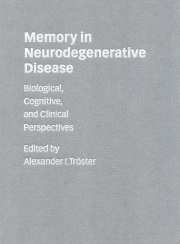Book contents
- Frontmatter
- Contents
- List of contributors
- Preface
- PART I Biological perspectives
- PART II Cognitive perspectives
- PART III Clinical perspectives
- 14 Biological and psychosocial risk factors for dementia and memory loss
- 15 Cross-cultural issues in the neuropsychological assessment of neurodegenerative disease
- 16 Psychometric issues in the clinical assessment of memory in aging and neurodegenerative disease
- 17 The role of memory assessment in the preclinical detection of dementia
- 18 Clinical differentiation of memory disorders in neurodegenerative disease
- 19 The impact of depression on memory in neurodegenerative disease
- 20 Preserved cognitive skills in neurodegenerative disease
- 21 Drug treatment of cognitive impairment in neurodegenerative disease: rationale, current experience and expectations for the future
- 22 Surgical interventions in neurodegenerative disease: impact on memory and cognition
- 23 Memory dysfunction in neurodegenerative disease: ethical and legal issues
- 24 Memory in neurodegenerative disease: clinical perspectives
- Index
23 - Memory dysfunction in neurodegenerative disease: ethical and legal issues
from PART III - Clinical perspectives
Published online by Cambridge University Press: 23 November 2009
- Frontmatter
- Contents
- List of contributors
- Preface
- PART I Biological perspectives
- PART II Cognitive perspectives
- PART III Clinical perspectives
- 14 Biological and psychosocial risk factors for dementia and memory loss
- 15 Cross-cultural issues in the neuropsychological assessment of neurodegenerative disease
- 16 Psychometric issues in the clinical assessment of memory in aging and neurodegenerative disease
- 17 The role of memory assessment in the preclinical detection of dementia
- 18 Clinical differentiation of memory disorders in neurodegenerative disease
- 19 The impact of depression on memory in neurodegenerative disease
- 20 Preserved cognitive skills in neurodegenerative disease
- 21 Drug treatment of cognitive impairment in neurodegenerative disease: rationale, current experience and expectations for the future
- 22 Surgical interventions in neurodegenerative disease: impact on memory and cognition
- 23 Memory dysfunction in neurodegenerative disease: ethical and legal issues
- 24 Memory in neurodegenerative disease: clinical perspectives
- Index
Summary
INTRODUCTION
The progressive impairment of memory functions constitutes the primary clinical symptom of most of the neurodegenerative conditions which are the subject of this book. The study of memory dysfunction in this context, in which certain degrees and subtypes of impairment are considered to be abnormal and the direct product of specific neuropathological changes is certainly a welcome change from the time when clinical observations associated with these conditions were considered to be an inevitable byproduct of ‘normal aging’ (Ruscio and Cavarrochi 1984). This book itself is evidence of the fact that so-called ‘senility’ is not an inevitable consequence of aging, such that the term itself, along with such professional colloquialisms as ‘organic brain syndrome’, now have an antique quality which renders the speaker of such terms ‘scientifically incorrect’. The accelerating biomedicalization of the dementias during the past two decades can be directly attributed to the dual impact of cutting-edge research, such as the recent work indicating an association of specific alleles for apolipoprotein E with probable Alzheimer's disease (AD) (Reiman et al. 1996; Chapters 17 and 18) and the impetus provided by changing population demographics characteristic of modern industrialized societies. Projections that the proportion of the population aged 85 years and older will be as high as 18% by the year 2040 (Taeuber 1990) have legitimized epidemiological questions regarding the inevitability of dementing conditions (Drachman 1994). Concomitant with these developments is an increasing awareness of the social, legal and ethical issues associated with all of the neurodegenerative disease processes resulting in dementia (Binstock et al. 1992) and a healthy skepticism regarding any tendency to biomedicalize the dementias to the exclusion of these concerns (Lyman 1989).
- Type
- Chapter
- Information
- Memory in Neurodegenerative DiseaseBiological, Cognitive, and Clinical Perspectives, pp. 377 - 389Publisher: Cambridge University PressPrint publication year: 1998
- 2
- Cited by

